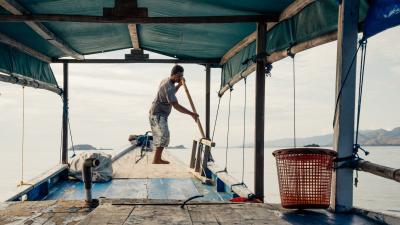The International Fund for Fishing Safety goes global – 65,000 fishers supported
The International Fund for Fishing Safety, has committed funding totaling £220,000 to support six fishing safety projects.
This page is approximately a 3 minute read
This page was published on

In Ghana, fishing is a way of life for around 10% of the population working across the seafood value chain. But most fishers lack basic safety equipment like life jackets and communication devices, putting lives at risk.
Friends of the Nation partnered with ProSea to explore how to improve fisher safety through a different approach. What makes this project unique is its focus on changing the mindset of the fishers, not just jumping in and giving them safety equipment. We want them to understand the need to take safety seriously, be empowered, and to take responsibility for their own safety.
We’ve started small, working in the Western Region communities of Shama, Dixcove, and Axim. Even though we’re still in the pilot phase, the impact is already being felt. Last month, we brought fishers together for a two-day national workshop in response to Ghana’s ratification of ILO Convention 188, the international agreement that protects decent working conditions for fishers. Bringing fishers to the table was a breakthrough, as it afforded them the opportunity to speak for themselves. They’re beginning to see the value of leading change.
When we met Friends of the Nation, we immediately saw the alignment. They had the idea of a tailored safety reporting mechanism; we brought the focus on education and awareness. Our core belief is simple: before you can change behaviour, people need to understand why. If someone tells me what to do without explaining the reason, I’ll ignore it. Fishers are no different.
A turning point came in April, at the two-day national workshop in Accra. It was originally scheduled for later in the project but moved forward after Ghana ratified ILO C188. It helped bring regulators like the Ghana Maritime Authority, Fisheries Commission, and Labour Department to the table and, most importantly, small-scale fishers, who are often excluded from such conversations. This time, they spoke for themselves.
This programme isn’t a quick fix. Ghana’s coastline is vast. We can’t reach every landing site. That’s why we’re investing in local ambassadors, people who will carry the message forward. We describe it like a droplet of oil on water: start small, and let the ripples spread.
We also see potential in involving the offshore industry. A safer working environment benefits everyone. If they get involved, they too can become ambassadors. The foundations we’ve laid are strong, built on real partnership, shared ownership, and open dialogue. The ripples are beginning.
IFFS was set up by Lloyd’s Register Foundation, The Seafarers’ Charity, and FISH Platform, to fund practical improvements in safety led by fishing organisations on the ground, primarily in the Global South and among smaller-scale fishers. In Ghana, the Dutch ProSea Foundation is working in partnership with a local Ghanaian organisation called Friends of the Nation. Practical safety training in local languages will be delivered, and a hazard reporting system established. IFFS funding will thereby help to save lives in Ghana’s fisheries sector, which provides livelihoods for over three million people (8% of the population).